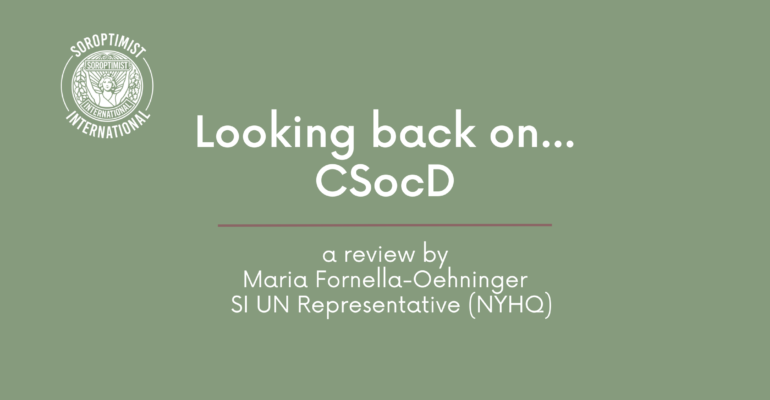The 61st session of the Commission on Social Development (CSocD) took place 6-15 February 2023, at the United Nations Headquarters in NY. Under the chairmanship of Ambassador Alya Ahmed Saif Al-Thani of Qatar the session was held entirely in person for the first time since 2020. The priority theme for this session was “Creating productive employment and decent work for all as a way of overcoming inequalities to accelerate recovery from the COVID-19 pandemic and the full implementation of the 2030 Agenda for Sustainable Development”.
Special attention was given to devising effective strategies in new and sustainable sectors to create productive employment and mitigate the impact of COVID-19 on already existing inequalities. Women and youth employment were front and centre of every discussion.
The Commission’s key mandate is its follow-up on the implementation of the Copenhagen declaration of 1995 and its three pillars:
- Eradication of poverty
- Full employment
- Social inclusion.
It is also in charge of the review process of the Madrid Plan of Action on Ageing as well as the World Programme of Action for Youth. The priority theme this year, with its focus on decent work, brought together the two processes, thus enabling a very direct and productive intergenerational dialog.
Throughout the year, the NGO Committee (NGO CSocD) had focused its advocacy Civil Society Declaration (which SI signed, along with 1100 others) on the crises of inequality (gender, socio-economic, geographical), which the devastating effects of the pandemic have made more prominent, especially in the labour market, and demanding long-term policies to solve them: promoting workers’ rights and the formalisation of work, so that all workers are protected under a strong social protection system; ensuring a safe working environment and decent pay, recognising unpaid care work and the principle of gender co-responsibility, and securing access to quality education and lifelong learning, including universal access to digital technology and internet services.
Main advocacy emphasis was placed on rebuilding trust, investing in human capital, and strengthening accountability of institutions, enacting social inclusion, gender sensitivity and non-discriminative policies, and increasing financing for development.
The overarching civil society proposition was that, to face this critical moment, a Global Fund for Social Protection must be established, and a New Social Contract must be forged to foster trust, increase participation and inclusion, and redefine human development.
The Commission’s final draft Resolution[1] on the priority theme “recognised” most of civil society demands and encouraged member states to find ways to implement them, but stopped short of requiring new commitments and demanding implementation of previous obligations.
It lacked boldness and creativity, for example by calling on member states to “recognise, reduce, and redistribute women and girls’ disproportionate share of unpaid care and domestic work” but then weakening it by only “encouraging” member states to describe what those measures could be. It encouraged member states of consider support for the Global Accelerator on Jobs and Social Protection for a Just Transition but did not mention the establishment of a Global Fund for Social Protection, or a New Social Contract to cement those demands. It encompasses 62 operative paragraphs but very little action language.
In conclusion, it was a rich session in content but short on new commitments. The three objectives of the Copenhagen declaration are still the main pillars of social development: eradication of poverty, promotion of full and productive employment and fostering social inclusion the Commission’s foundations are still solid but its purpose must be strengthened. The convening of a proposed World Social Summit to celebrate its thirtieth anniversary in 2025 would be a great opportunity to rejuvenate it.
>> Read Soroptimist International’s CSocD Written Statement
>> Read Soroptimist International’s CSocD Oral Statement – as read by UN Representative Despoina Afroditi Milaki
[1] Under Draft Resolutions, select “Creating full and productive employment and decent work for all as a way of overcoming inequalities to accelerate the recovery from the COVID-19 pandemic and the full implementation of the 2030 Agenda for Sustainable Development” to view the Resolutions.

